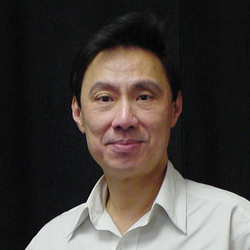Honoring the Career of Professor Emeritus Horace Yuen
Yuen retired in September 2021 after 41 years of service at Northwestern

An expert in physics- and mathematics-based quantum and classical cryptography, Yuen investigated theoretical quantum optics and communication, the foundations of quantum physics, cryptographic protocols, information theory, and new quantum devices.
“Horace is a true scholar in the best sense. He is a deep thinker who takes on hard problems and produces truly pioneering work. It is a privilege to have him in our department,” said Randall Berry, John A. Dever Chair of Electrical and Computer Engineering at the McCormick School of Engineering.
Yuen pioneered the keyed communication in quantum noise (KCQ) approach. The mechanism employs a shared secret key to determine the quantum states generated for different data bit sequences, allowing users to decode data with a corresponding optimum quantum measurement.
Yuen; Prem Kumar, director of the Center for Photonic Communication and Computing and professor of electrical and computer engineering; and Geraldo Barbosa, former adjunct professor of electrical and computer engineering at Northwestern Engineering, received patent number 7333611 in February 2008 for the “Ultra-secure, ultra-efficient cryptographic system.” The system extends a short, shared secret key into a long, extended key which selects a quantum or classical signal set. The security level objective is achieved by adjusting the strength of each signal in the set according to the total number of signal sets.
Yuen also developed a cryptographic technique called the decoy bits method (DBM) with near ideal information-theoretic security in both quantum and classical key generation and data encryption. The DBM encryption system inserts random bits into a data sequence and subsequently discards the decoy bits during the decryption process.
Selim Shahriar, professor of electrical and computer engineering at Northwestern Engineering, collaborated with Yuen as a collaborator on a Multi-disciplinary University Research Initiative project using quantum teleportation for secure quantum communication.
“I had the opportunity to work closely with him on theoretical ideas and was amazed at the way he views concepts in an unorthodox manner. He often disagrees with notions taken for granted by the scientific community, and is proven to be right in most cases,” said Shahriar. “It has been an honor for me to serve as his colleague, and I am looking forward to continuing discussions about many aspects of physics with him during his tenure as an emeritus professor.”
Yuen received a PhD in electrical engineering and his master’s in electrical engineering, both from the Massachusetts Institute of Technology (MIT).
In 1996, he was among the inaugural recipients of the biennial International Quantum Award “for outstanding achievements in quantum science research” presented during the International Conference on Quantum Communication, Measurement and Computing.
The American Physical Society Council elected Yuen as a Fellow of the Society in 2004 “for seminal contributions to the theory of quantum communications and quantum measurements.”
In 2008, Yuen and Jeffrey Shapiro, Julius A. Stratton Professor of Electrical Engineering at MIT, received the Quantum Electronics Award from the Institute of Electrical and Electronics Engineers “for pioneering and seminal contributions to the theory of the generation, detection, and applications of novel states of light.”
In 2020, Yuen’s paper “Two-photon Coherent States of the Radiation Field” was selected for inclusion in Physical Review A’s 50th Anniversary Milestone Collection of milestone papers in the fields of atomic, molecular, and optical physics and quantum information. Yuen’s research into two-photon coherent state, or squeezed state of light, was foundational to potential applications in precision measurement and optical communications. Squeezed light is now routinely used to enhance the sensitivity of gravitational wave detectors.
“In many ways, his prediction about squeezed light ushered in the era of entanglement-enhanced precision metrology, which is one of the pillars of the so-called second quantum revolution taking place around the world today,” said Shahriar. “If I had the opportunity, I would be delighted to nominate him for the Nobel Prize in Physics, which he richly deserves! "
Related link:
Northwestern Perspective, winter 1991 "Quantum Leap: Horace Yuen Squeezes the Uncertainty Out of Light"
